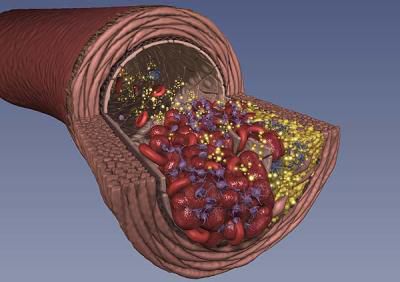-
 Grading
Grading
-
 IPSec
IPSec
-
 Soyuz
Soyuz
-
 Planking
Planking
-
 Gammarus
Gammarus
-
 AB Label
AB Label
-
 Contrast
Contrast
-
 Astrometric coordinates
Astrometric coordinates
-
 Magnetometer
Magnetometer
-
 Embossing
Embossing
-
 Mod
Mod
-
 Magnesium
Magnesium
-
 Drought
Drought
-
 Deciduous forest
Deciduous forest
-
 Doppler
Doppler
-
 Fibrinogen
Fibrinogen
-
 Parasite
Parasite
-
 To graze
To graze
-
 Prosodia
Prosodia
-
 U
U
-
 Bone density
Bone density
-
 Somite
Somite
-
 Apnoea
Apnoea
-
 Proton-proton chain
Proton-proton chain
-
 Cyberspace
Cyberspace
-
 Body Mass Index
Body Mass Index
-
 Goitre
Goitre
-
 Summer solstice
Summer solstice
-
 Phytates
Phytates
-
 Anatomy
Anatomy
Thrombosis
A thrombosis is a blood clot which forms in a vein (venous thrombosis) or artery (arterial thrombosis). The blood coagulates when circulating blood is slowed by immobilisation of a limb (leg) or by an obstruction (atheroma).
Consequences of thrombosis
Venous thrombosis may cause phlebitis, obstruction of the venous circulation resulting in pain, local warmth, and swelling of the leg.
Arterial thrombosis may ultimately obstruct the artery and cause ischaemia.
Embolism
In both situations, detachment of the clot and its transport through the blood circulation to other organs is called embolism. The clot then blocks the circulation in organs such as the lung (pulmonary embolism) or the brain (CVA), and can also lead to myocardial infarction.
 Thrombosis can be venous or arterial. © DR
Thrombosis can be venous or arterial. © DR
Latest
Fill out my online form.



